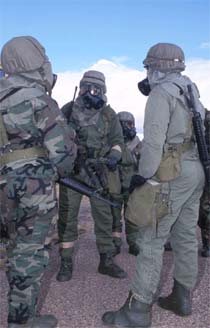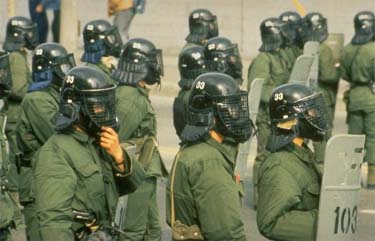 |


|
|
Biological and Chemical Weapons |
|
By Environmental News Service
Iran is using sources in Russia, China, North Korea and Western Europe to make chemical, biological, nuclear and advanced conventional weapons and their delivery systems, the unclassified CIA report said. The report, "Acquisition of Technology Relating to Weapons of Mass Destruction and Advanced Conventional Munitions," is sent to Congress every six months. The current report, released September 7, covers the period from July 1 to December 31, 2000. In it the CIA analyzes weapons of mass destruction and missile technology acquisition by Iran, Iraq, Libya, Syria, Sudan, Egypt, India, Pakistan, and North Korea. It also examines key suppliers Russia, North Korea, China and western nations. "Iran, a Chemical Weapons Convention (CWC) States party, already has manufactured and stockpiled chemical weapons - including blister, blood, choking and probably nerve agents, and the bombs and artillery shells for delivering them," the CIA said. "Tehran continued its efforts to seek considerable dual-use biotechnical materials, equipment, and expertise from abroad - primarily from entities in Russia and Western Europe - ostensibly for civilian uses. We judge that this equipment and know-how could be applied to Iran’s biological warfare (BW) program. Iran probably began its offensive BW program during the Iran-Iraq war, and it may have some limited capability for BW deployment," the CIA explained. Many of these countries attempting to develop domestic missile and weapons of mass destruction production capabilities will eventually become suppliers, the report said. And as such, they do not belong to recognized supplier groups and do not adhere to widely recognized export constraints. CIA investigators found that Russia, China and North Korea continue to supply crude ballistic missile related equipment, technology and expertise to Iran. In Iraq, it is likely that the country has used the period since December 1998, when all international arms inspections ceased, to reconstitute prohibited programs. "We assess that since the suspension of U.N. inspections in December of 1998, Baghdad has had the capability to reinitiate both its CW [chemical weapons] and BW [biological weapons] programs within a few weeks to months," the report said. "Without an inspection monitoring program, however, it is more difficult to determine if Iraq has done so." North Korea has continued to procure raw materials and components for its ballistic missile programs from various sources, and especially through North Korean firms in China. North Korea is capable of producing and delivering through munitions a variety of chemical and biological weapons.
North Korea continued to export significant ballistic missile related equipment, components, materials and technical expertise to countries in the Middle East, South Asia, and North Africa. Egypt has maintained a relationship with North Korea on ballistic missiles and has maintained a Scud [missile] inventory. Syria has actively sought chemical weapons related materials and expertise from foreign sources over the six month reporting period, the CIA reports. Syria has also continued work on a solid-propellant rocket motor development and production capability. Sudan has continued developing the capability to produce chemical weapons. Sudan has also been seeking older advanced conventional weapons and cheaper conventional weapons. India continues its nuclear weapons development program. Sources in Russia and Western Europe remained India's primary conduits of missile related and dual-use technology transfers - items which have both civilian and military applications. China has continued to provide "significant assistance" to Pakistan's ballistic missile program, the CIA reports. Russian entities have continued to supply a variety of ballistic missile related goods and technical know-how to countries such as Iran, India, China and Libya. "Monitoring Russian proliferation behavior, therefore, will remain a very high priority," the report said. "Countries determined to maintain weapons of mass destruction and missile programs over the long term have been placing significant emphasis on increased self-sufficiency and attempts to insulate their programs against interdiction and disruption," the CIA said, "as well as trying to reduce their dependence on imports by developing domestic production capabilities." The unclassified report is available online at: http://www.cia.gov/cia/publications/bian/bian_sep_2001.htm |

© 1997-2002 BEI
 WASHINGTON, DC, - A new Central Intelligence Agency (CIA) report released to Congress just days before the terrorist attacks on the United States Tuesday reveals that Iran and other Middle Eastern countries are expanding their capacity to produce weapons of mass destruction.
WASHINGTON, DC, - A new Central Intelligence Agency (CIA) report released to Congress just days before the terrorist attacks on the United States Tuesday reveals that Iran and other Middle Eastern countries are expanding their capacity to produce weapons of mass destruction.
